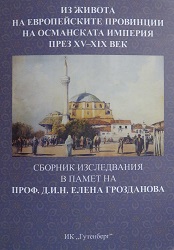Търновският епископат и Русия XV-XVII век
The Tarnovo Episcopate and Russia (15th-17th centuries)
Author(s): Ivan Tyutyundzhiev
Subject(s): Christian Theology and Religion, Politics, History, Anthropology, Cultural history, History of Church(es), Geography, Regional studies, Physical Geopgraphy, Historical Geography, Sociology, History of ideas, Middle Ages, Modern Age, Special Historiographies:, Theology and Religion, Comparative Studies of Religion, Cultural Anthropology / Ethnology, 15th Century, 16th Century, 17th Century, The Ottoman Empire, Eastern Orthodoxy, Inter-Ethnic Relations, History of Religion
Published by: Издателска къща "Гутенберг"
Keywords: Orthodox; Orthodox and Uniate church; Ottoman empire; Ottoman invasion; history of religion; History; Balkan history; Russia; International relations;
Summary/Abstract: The image of Ottoman invasion of the Bulgarian lands, the Tarnovo Patriarchate, in its capacity as the "Mother of All Bulgarian Churches", maintained international contacts throughout the Greek Orthodox world. The Patriarchate enjoyed high prestige among Orthodox Slav on account of its consistent anti-Unite stance, adopted after the Church Union of the Council of Lyons (1247). This stance differed drastically from the contradictory policy of Byzantium and the Church of Constantinople which were inclined to make compromises with the West and the Papal institution in Rome as part of an attempt to forge an alliance and oppose the invading Ottoman forces.
The Tarnovo Patriarchate strongly adhered the Orthodoxy and resisted Roman Catholic attempts at penetration in the territories under its pastoral care. The Bulgarian Orthodox Church by all probability had a major role in spreading Christianity among Cumans and some Tatars in Wallachia and Moldova in the 13 th and 14 th centuries . The high status of the Head of the Tarnovo Patriarchate was borne out by the participation of Patritach Simeon in the coronation of the Serbian monarch Stephen Dusan (1331-1335) and his Bulgarian wife Elena as Tsar and Tsarina and the transformation of the Serbian Archbishopric into a Patriarchate in 1346. Around the middle of the 14th c. the Tarnovo Patriarchate was established contacts with Russia.
In 1352 Patriarch Theodosius II of Tarnovo took part in the ordination of Theodorit, Metropolitan of the Principality of Galicia-Lithuania, as Metropolitan of Russia. For Russia Tarnovo was obviously an important spiritual centre holding authority over all Orthodox Slavs. At more or less the same time we encounter the appellation "Tsarigrad-Turnov" which reflected the idea of the Bulgarian capital as a "Third Rome" and "Second Constantinople". Further proof of the high status of Bulgarian clerics among Orthodox Slavs is provided by the enthronement, in the year 1375, of three patriarchs originating from Tarnovo: Euthymius (Evtimii) of Tarnovo (1375-1393), Ephraem of Pec, Patriarch of Serbia (1375-1380; 1389-1392), and Cyprian, Metropolitan of Kiev and all of Russia (1375-1406).
The survey of Bulgarian-Russian spiritual ties presented above aims at correcting a view still current in historiography according to which, between the 16th and 18th centuries, church influence followed a North-South (rather than a South-North) axis. While we may assume that such a view reflects the state of affairs in the 18th century, the earlier times of Ottoman domination (15th-17th cc.) were marked by attempts on the part of Tarnovo clerical elite to take part in the most important initiative aiming to increase Russia's prestige as the only independent and most powerful Orthodox Slavonic state. Higher clerics made a point of mentioning the names of Russians monarchs in church services intended for Bulgarian Christian congregations and thus seered Bulgarian expectations of political liberation in the direction of Russia.
- Page Range: 605-635
- Page Count: 31
- Publication Year: 2016
- Language: English, Bulgarian
- Content File-PDF

